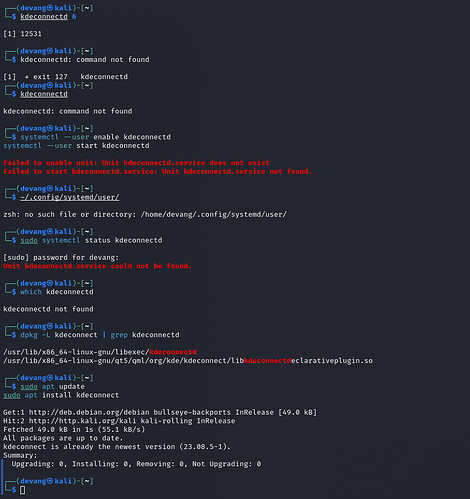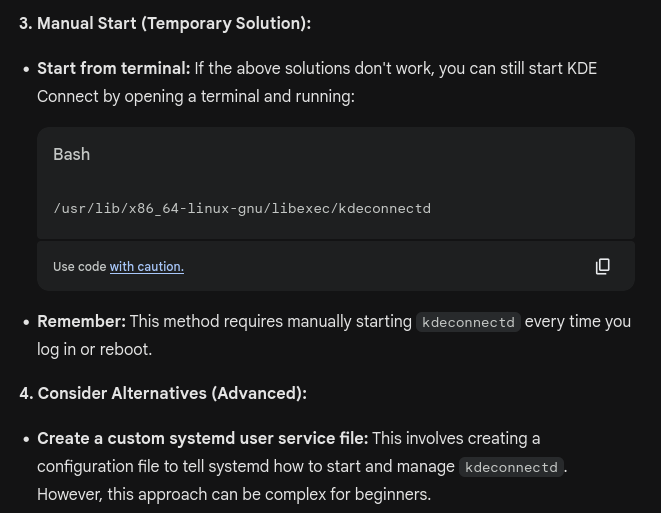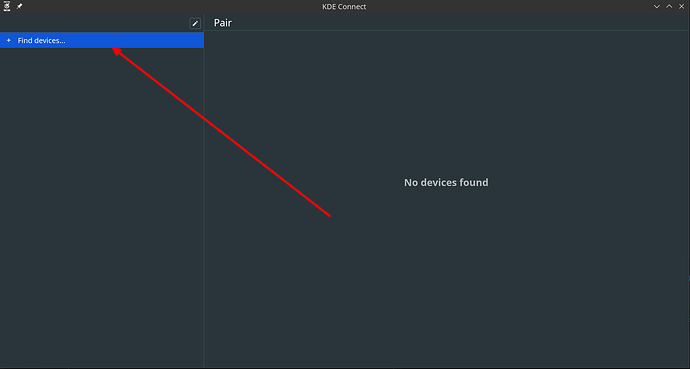i reinstall kdeconnect but it shows same error.
i tried to update desktop environment as well.
and i also tried chatgpt to fix my problem.
but nothing workout.
finally after lots of tries i found a temporary solution.
but i want to start the kdeconnectd service automatically can any body know how to fix my issue permanently.
I am having the same issue, kdeconnectd disappeared from my device, it was there before and i could connect to my phone.
When i do:
$ sudo /usr/lib/x86_64-linux-gnu/libexec/kdeconnectd
I get:
QStandardPaths: XDG_RUNTIME_DIR not set, defaulting to '/tmp/runtime-root'
QStandardPaths: XDG_RUNTIME_DIR not set, defaulting to '/tmp/runtime-root'
Failed to load Legacy provider
Hi - just checking, are you using Kali Linux as the person who created this topic was?
Nope, i am using MXLinux + KDE
System info
System:
Kernel: 6.1.0-28-amd64 arch: x86_64 bits: 64 compiler: gcc v: 12.2.0
parameters: BOOT_IMAGE=/vmlinuz-6.1.0-28-amd64
root=UUID=513d27e1-c07a-4095-bb2c-b0c07d5b8699 ro quiet splash
resume=UUID=513d27e1-c07a-4095-bb2c-b0c07d5b8699 resume_offset=150990848
Desktop: KDE Plasma v: 5.27.5 wm: kwin_x11 dm: SDDM Distro: MX-23.4_KDE_x64
Libretto September 15 2024 base: Debian GNU/Linux 12 (bookworm)
Machine:
Type: Desktop Mobo: Micro-Star model: MAG B550 TOMAHAWK MAX WIFI (MS-7C91)
v: 1.0 serial: <filter> UEFI: American Megatrends LLC. v: 2.91
date: 09/09/2024
CPU:
Info: model: AMD Ryzen 9 5950X socket: AM4 bits: 64 type: MT MCP
arch: Zen 3+ gen: 4 level: v3 note: check built: 2022 process: TSMC n6 (7nm)
family: 0x19 (25) model-id: 0x21 (33) stepping: 2 microcode: 0xA201210
Topology: cpus: 1x cores: 16 tpc: 2 threads: 32 smt: enabled cache:
L1: 1024 KiB desc: d-16x32 KiB; i-16x32 KiB L2: 8 MiB desc: 16x512 KiB
L3: 64 MiB desc: 2x32 MiB
Speed (MHz): avg: 2200 min/max: 2200/5083 boost: enabled
base/boost: 3400/5050 scaling: driver: acpi-cpufreq governor: ondemand
volts: 1.1 V ext-clock: 100 MHz cores: 1: 2200 2: 2200 3: 2200 4: 2200
5: 2200 6: 2200 7: 2200 8: 2200 9: 2200 10: 2200 11: 2200 12: 2200
13: 2200 14: 2200 15: 2200 16: 2200 17: 2200 18: 2200 19: 2200 20: 2200
21: 2200 22: 2200 23: 2200 24: 2200 25: 2200 26: 2200 27: 2200 28: 2200
29: 2200 30: 2200 31: 2200 32: 2200 bogomips: 217606
Flags: avx avx2 ht lm nx pae sse sse2 sse3 sse4_1 sse4_2 sse4a ssse3 svm
Vulnerabilities:
Type: gather_data_sampling status: Not affected
Type: itlb_multihit status: Not affected
Type: l1tf status: Not affected
Type: mds status: Not affected
Type: meltdown status: Not affected
Type: mmio_stale_data status: Not affected
Type: reg_file_data_sampling status: Not affected
Type: retbleed status: Not affected
Type: spec_rstack_overflow mitigation: safe RET
Type: spec_store_bypass mitigation: Speculative Store Bypass disabled via
prctl
Type: spectre_v1 mitigation: usercopy/swapgs barriers and __user pointer
sanitization
Type: spectre_v2 mitigation: Retpolines; IBPB: conditional; IBRS_FW;
STIBP: always-on; RSB filling; PBRSB-eIBRS: Not affected; BHI: Not
affected
Type: srbds status: Not affected
Type: tsx_async_abort status: Not affected
Graphics:
Device-1: NVIDIA GA104 [GeForce RTX 3060] vendor: Micro-Star MSI
driver: nvidia v: 535.183.06 non-free: 530.xx+
status: current (as of 2023-03) arch: Ampere code: GAxxx
process: TSMC n7 (7nm) built: 2020-22 pcie: gen: 2 speed: 5 GT/s lanes: 16
link-max: gen: 4 speed: 16 GT/s bus-ID: 2b:00.0 chip-ID: 10de:2487
class-ID: 0300
Display: x11 server: X.Org v: 1.21.1.7 with: Xwayland v: 22.1.9
compositor: kwin_x11 driver: X: loaded: nvidia
unloaded: fbdev,modesetting,nouveau,vesa alternate: nv gpu: nvidia
display-ID: :0 screens: 1
Screen-1: 0 s-res: 2560x1440 s-dpi: 108 s-size: 602x333mm (23.70x13.11")
s-diag: 688mm (27.09")
Monitor-1: DP-0 res: 2560x1440 hz: 165 dpi: 108
size: 600x330mm (23.62x12.99") diag: 685mm (26.96") modes: N/A
API: OpenGL v: 4.6.0 NVIDIA 535.183.06 renderer: NVIDIA GeForce RTX
3060/PCIe/SSE2 direct-render: Yes
Audio:
Device-1: NVIDIA GA104 High Definition Audio vendor: Micro-Star MSI
driver: snd_hda_intel v: kernel pcie: gen: 4 speed: 16 GT/s lanes: 16
bus-ID: 2b:00.1 chip-ID: 10de:228b class-ID: 0403
Device-2: AMD Starship/Matisse HD Audio vendor: Micro-Star MSI
driver: snd_hda_intel v: kernel pcie: gen: 4 speed: 16 GT/s lanes: 16
bus-ID: 2d:00.4 chip-ID: 1022:1487 class-ID: 0403
API: ALSA v: k6.1.0-28-amd64 status: kernel-api tools: alsamixer,amixer
Server-1: PipeWire v: 1.0.0 status: n/a (root, process) with:
1: pipewire-pulse status: active 2: wireplumber status: active
3: pipewire-alsa type: plugin 4: pw-jack type: plugin
tools: pactl,pw-cat,pw-cli,wpctl
Network:
Device-1: MEDIATEK MT7921K Wi-Fi 6E 80MHz driver: mt7921e v: kernel
modules: wl pcie: gen: 2 speed: 5 GT/s lanes: 1 bus-ID: 29:00.0
chip-ID: 14c3:0608 class-ID: 0280
IF: wlan0 state: down mac: <filter>
Device-2: Realtek RTL8125 2.5GbE vendor: Micro-Star MSI driver: r8169
v: kernel pcie: gen: 2 speed: 5 GT/s lanes: 1 port: f000 bus-ID: 2a:00.0
chip-ID: 10ec:8125 class-ID: 0200
IF: eth0 state: up speed: 1000 Mbps duplex: full mac: <filter>
IF-ID-1: docker0 state: down mac: <filter>
Bluetooth:
Device-1: MediaTek Wireless_Device type: USB driver: btusb v: 0.8
bus-ID: 1-9:6 chip-ID: 0e8d:0608 class-ID: e001 serial: <filter>
Report: hciconfig ID: hci0 rfk-id: 0 state: up address: <filter> bt-v: 3.0
lmp-v: 5.2 sub-v: 2402 hci-v: 5.2 rev: 1911
Info: acl-mtu: 1021:6 sco-mtu: 240:8 link-policy: rswitch sniff
link-mode: peripheral accept service-classes: rendering, capturing, object
transfer, audio, telephony
Drives:
Local Storage: total: 1.82 TiB used: 216.91 GiB (11.6%)
ID-1: /dev/nvme0n1 maj-min: 259:0 vendor: MSI model: M480 PRO 2TB
size: 1.82 TiB block-size: physical: 512 B logical: 512 B speed: 63.2 Gb/s
lanes: 4 type: SSD serial: <filter> rev: EIFM80.0 temp: 31.9 C scheme: GPT
SMART: yes health: PASSED on: 169d 22h cycles: 406
read-units: 15,497,035 [7.93 TB] written-units: 37,701,894 [19.3 TB]
Partition:
ID-1: / raw-size: 1.82 TiB size: 1.79 TiB (98.37%) used: 216.64 GiB (11.8%)
fs: ext4 block-size: 4096 B dev: /dev/dm-0 maj-min: 253:0
mapped: luks-63cbeba9-f2f0-4001-90db-2b70de042925
ID-2: /boot raw-size: 1024 MiB size: 973.4 MiB (95.06%)
used: 271.8 MiB (27.9%) fs: ext4 block-size: 4096 B dev: /dev/nvme0n1p2
maj-min: 259:2
ID-3: /boot/efi raw-size: 256 MiB size: 252 MiB (98.46%)
used: 274 KiB (0.1%) fs: vfat block-size: 512 B dev: /dev/nvme0n1p1
maj-min: 259:1
Swap:
Kernel: swappiness: 15 (default 60) cache-pressure: 100 (default)
ID-1: swap-1 type: file size: 37.26 GiB used: 0 KiB (0.0%) priority: -2
file: /swap/swap
Sensors:
System Temperatures: cpu: 39.8 C mobo: N/A gpu: nvidia temp: 32 C
Fan Speeds (RPM): N/A gpu: nvidia fan: 0%
Info:
Processes: 535 Uptime: 4m wakeups: 0 Memory: 31.26 GiB
used: 7.39 GiB (23.7%) Init: systemd v: 252 target: graphical (5)
default: graphical tool: systemctl Compilers: gcc: 12.2.0 alt: 12
clang: 14.0.6 Packages: 3173 pm: dpkg pkgs: 3158 libs: 1740
tools: apt,apt-get,aptitude,nala pm: rpm pkgs: 0 pm: flatpak pkgs: 15
Shell: Sudo (sudo) v: 1.9.13p3 default: Bash v: 5.2.15 running-in: konsole
inxi: 3.3.26
You should take some time to learn how to format a post, using Tilde or backticks to paste code instead of uploading images like a noob…
Using Kali Linux with KDEConnect and not understanding this basic tactic brands you as a noob who want’s to be thought of as a respected hacker - not an IT Professional.
You should consider a more basic distribution with a helpful forum, and also learn how to use the terminal - including the man pages.
You should also learn how to manage your services using systemd - though if you had installed a decent KDE desktop, it would actually just work out of the box.
TL;DR
-
If you’re a Kali user - RTFM because you’re already proficient.
-
If you aren’t, then install something more suitable and learn before migrating to an advanced distribution.
Are you sure you didn’t change something ( settings in phone maybe, as in, which directory to use) cause I’m on MX and kdeconnect works every time, all the time. I can go visit Dorothy and the wicked witch, come back and it just connects.
Ya, I just told your girlfriend what you said…
Wow, are you really supposed to do that?
Basically, you should be able to simply install kdeconnect. There’s also ‘indicator-kdeconnect’, KDE Connect SMS which should be pulled in with KDEConnect, but check that anyway.
To see if it’s running, you should use something like this:
ps -e | grep kdeconnectd
What your command appears to be trying to do is to launch the kdeconnectd daemon with superuser privileges - not sure why you’d do that… can you explain why you think you should give it superuser powers?
kdeconnect-app
Should launch the KDEConnect window.
There’s also a command kdeconnect-cli.
Anyway, mixing up all these commands and running stuff as sudo is likely to do damage well outside any minor issue you might have. As a general rule, never use sudo.
That’s right - if you run a command like pacman -Syu on an Arch system, the terminal will come back:
error: you cannot perform this operation unless you are root.
This is safe.
You can then press AltS and run it as sudo. You don’t need to put sudo in front unless you are sure it’s the right thing to do.
What can I say, it was the first thing that came to my mind. ![]()
I get nothing when i do this. There is no kdeconnectd on my device, i tried reinstalling kdeconnect and still nothing.
I am getting this
$ kdeconnect-app
kf.i18n: KLocalizedString: Using an empty domain, fix the code. msgid: "(c) 2015, Aleix Pol Gonzalez" msgid_plural: "" msgctxt: ""
kf.i18n: KLocalizedString: Using an empty domain, fix the code. msgid: "KDE Connect" msgid_plural: "" msgctxt: ""
kf.i18n: KLocalizedString: Using an empty domain, fix the code. msgid: "KDE Connect" msgid_plural: "" msgctxt: ""
kf.i18n: KLocalizedString: Using an empty domain, fix the code. msgid: "Maintainer" msgid_plural: "" msgctxt: ""
kf.i18n: KLocalizedString: Using an empty domain, fix the code. msgid: "Aleix Pol Gonzalez" msgid_plural: "" msgctxt: ""
kf.i18n: KLocalizedString: Using an empty domain, fix the code. msgid: "URL to share" msgid_plural: "" msgctxt: ""
kdeconnect.interfaces: error while refreshing device list "Message recipient disconnected from message bus without replying"
kdeconnect.interfaces: error while refreshing device list "Message recipient disconnected from message bus without replying"
kdeconnect.interfaces: error while refreshing device list "No such object path '/modules/kdeconnect'"
kdeconnect.interfaces: dbus interface not valid
kdeconnect.interfaces: dbus interface not valid
kdeconnect.interfaces: dbus interface not valid
kdeconnect.interfaces: dbus interface not valid
kdeconnect.interfaces: dbus interface not valid
kdeconnect.interfaces: dbus interface not valid
file:///usr/lib/x86_64-linux-gnu/qt5/qml/org/kde/kdeconnect/DBusProperty.qml:48: ReferenceError: write is not defined
QQuickItem::stackBefore: Cannot stack QQuickRectangle(0x7f9978012890, parent=0x564288b67960, geometry=0,0 0x0) before QQuickPopupItem(0x564288d09fb0), which must be a sibling
QQuickItem::stackBefore: Cannot stack QQuickRectangle(0x5642890fd9e0, parent=0x564288b67960, geometry=0,0 0x0) before QQuickPopupItem(0x564288d09fb0), which must be a sibling
kdeconnect.interfaces: dbus interface not valid
kdeconnect.interfaces: error while refreshing device list "Message recipient disconnected from message bus without replying"
The last line is the error i get when i press on “Find devices”
kdeconnect.interfaces: error while refreshing device list "Message recipient disconnected from message bus without replying"
I don’t know it’s weird, i never changed anything on my android phone, i installed docker on my MXLinux. The weird thing is that i cant find kdeconnectd on my machine, even when i reinstall kdeconnect
However, one time kdeconnectd was using too much CPU and i killed the process using btop.


